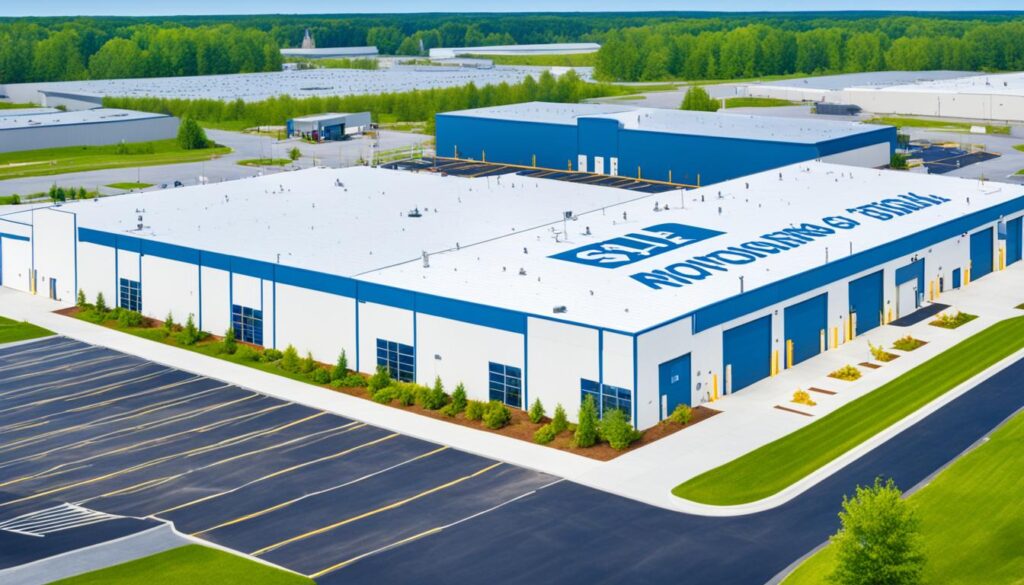Selling a manufacturing business can be a complex process, but with the right steps and strategies, you can maximize the value of your business and navigate the sale smoothly. The process involves building a strong deal team, compiling necessary documents, marketing the deal to potential buyers, undergoing due diligence, closing the deal, and transitioning the business to the new owner.
It’s important to have a clear understanding of the factors that impact the valuation of a manufacturing business asset sale, including financial performance, industry conditions, growth potential, assets, customer relationships, and market demand. By preparing the necessary documentation and getting your business in order, you can attract the right buyers and negotiate a successful sale.
Key Takeaways:
Maximize the value of your manufacturing business by understanding the factors that impact its valuation.
Compile the necessary documents and financial statements to attract potential buyers.
Market your business effectively to reach the right buyers and generate interest in the deal.
Undergo due diligence to ensure transparency and build trust with potential buyers.
Negotiate the terms of the sale and close the deal, transitioning the business to the new owner smoothly.
Step #1: What’s the Value of Your Manufacturing Business
Valuing a manufacturing business is a crucial step in the selling process. By understanding the factors that impact the value of your business, you can strategically price it to attract potential buyers and maximize your return. The market-based approach, which focuses on pricing multiples, is commonly used to determine the value of a business.
When valuing your manufacturing business, key considerations include:
Pricing Multiples: Manufacturing businesses typically sell at an average earnings multiple of around 3. This means that the sale price is approximately three times the business’s annual earnings. Revenue multiples for manufacturing businesses typically range from 0.5 to 0.8.
Financials: Organized and accurate financial records are crucial for a comprehensive valuation analysis. These records, such as income statements and balance sheets, provide important insights into the financial performance and stability of your business.
Net Value of Assets: Assessing the net value of your business’s assets, including equipment, real estate, and intellectual property, is essential in determining its overall worth.
Growth Forecasts: Consider the projected growth potential of your manufacturing business. Factors such as market demand, technological advancements, and industry conditions can have a significant impact on its value.
Staff Skills: Evaluate the expertise and skills of your employees. A highly skilled and experienced workforce may contribute to a higher valuation due to their potential to drive growth and innovation within the business.
Market Value: Understanding the current market conditions and recent sales of similar manufacturing businesses can provide insights into the market value of your own business.
Consulting with professionals, such as accountants and business appraisers, is highly recommended to obtain an accurate assessment of your manufacturing business’s value. These experts can analyze your financials, evaluate market trends, and provide insights into manufacturing industry–specific valuation methodologies.
Remember, the accurate valuation of your manufacturing business is essential in attracting the right buyers and negotiating a successful sale. Investing the time and effort to understand its true worth can ultimately lead to a more favorable outcome for your business.
Valuation Comparison
| Valuation Method | Multiplier |
|---|---|
| Earnings Multiples | 3x |
| Revenue Multiples | 0.5x to 0.8x |
Step #2: Enlisting Professional Help
Selling a manufacturing business involves complex legal and financial matters, so it’s essential to enlist the help of professionals. Hiring an attorney, accountant, business appraiser, business broker, or M&A advisor can provide a business owner the necessary expertise and guidance to ensure a successful sale.
Legal Review and Documentation
When selling your manufacturing business, engaging an attorney is crucial to handle legal documentation, such as non-disclosure agreements, letters of intent, and buy-sell agreements. They can also assist in conducting a legal review of your business structure, contracts, and compliance to minimize any potential legal risks related to the sale. With their knowledge and experience, attorneys help protect your interests throughout the selling process.
Financial Expertise
Accountants play a vital role in preparing financial statements, analyzing tax implications, and determining the seller’s discretionary earnings. They provide valuable guidance on how to optimize your financials to attract potential buyers and maximize the value of your business.
Professional Business Appraisal
A business appraiser is often necessary to conduct a comprehensive valuation analysis of your manufacturing business. They have the expertise to evaluate factors such as financial performance, growth potential, market conditions, and other critical variables that impact the value of your business. Their objective assessment helps determine a fair market value for your business.
Business Brokers and M&A Advisors
Involving a business broker or M&A advisor can be instrumental in finding potential buyers and negotiating the terms of the sale. These professionals possess market knowledge, industry connections, and experience in facilitating the buying and selling of businesses. They can identify qualified buyers, manage the marketing of your manufacturing business, and guide you through due diligence and the negotiation process, ensuring a smooth transaction from start to finish.
By enlisting the help of professionals such as attorneys, accountants, business appraisers, business brokers, or M&A advisors, you can leverage their expertise, market knowledge, and experience to navigate the complexities of selling your manufacturing business successfully.
Step #3: Planning Your Exit Strategy
Planning your exit strategy is crucial when selling a manufacturing business. Setting a sale timeline allows you to prepare in advance and position your business for a successful sale. You should aim to start preparing at least three years before the proposed sale date.
Gathering Important Documents
To ensure a smooth sale process, it’s essential to get your financial documents and operation in order. These documents play a significant role in determining the appeal and value of your business to potential buyers. Some key financial information and documents to gather include:
Income statements
Balance sheets
Tax returns
Customer lists
Supplier information
Employee details
Equipment records
Other important business information
Step #4: Finding Qualified Buyers
Finding the right buyers for your manufacturing business requires strategic marketing strategies and a targeted approach. Instead of casting a wide net, focus on reaching a select group of qualified buyers who have the resources and qualifications to purchase your niche manufacturing business.
Start by understanding your target market and identifying the types of buyers who are most likely to be interested in your manufacturing business. Consider whether you’re more likely to sell to a competitor, an investment fund, a private equity firm or another type of buyer.
Create a comprehensive list of potential buyers based on various criteria, including their reputation, compatibility with your business’s culture and future plans, and their ability to offer the best price. This buyer list will help you refine your outreach and focus on each potential buyer and those who are most likely to be a good fit for your business.
Confidentiality is key when approaching potential strategic buyers. Networking, leveraging industry connections, and working with a business broker or M&A advisor can help you identify and reach out to potential buyers while maintaining confidentiality throughout the process.
Once you’ve identified potential buyers, the negotiation process begins. This involves initial discussions, meetings, and ongoing negotiations to reach a favorable deal for your manufacturing business. A professional business broker or M&A advisor can be instrumental in guiding you through the negotiation process and ensuring you secure the best possible outcome experience selling manufacturing businesses.
By employing effective marketing strategies, targeting qualified buyers, maintaining confidentiality, and engaging in a strategic negotiation process, you and other manufacturing businesses can increase the likelihood of finding the ideal buyer who will provide a favorable deal for your manufacturing business.
Step #5: Due Diligence
Manufacturing companies often possess a diverse array of assets ranging from machinery and equipment to intellectual property and inventory. Conducting thorough due diligence enables sellers selling manufacturing businesses to present an accurate and comprehensive inventory of assets to potential buyers. By meticulously scrutinizing asset records, maintenance logs, and ownership documentation, sellers can verify the condition, ownership, and valuation of assets, thereby minimizing discrepancies and fostering transparency in the valuation process.
Identifying Operational Risks and Efficiencies
Manufacturing operations are inherently complex, encompassing a multitude of processes, from procurement and production to quality control and distribution. Due diligence offers prospective buyers insight into the operational efficiency and risks associated with the target company. By analyzing production workflows, supply chain management practices, and quality assurance protocols, sellers can identify operational inefficiencies, bottlenecks, and compliance risks that may impact the company’s value. Addressing these issues proactively during the due- diligence process phase not only enhances the company’s attractiveness to potential buyers but also facilitates smoother negotiations and post-acquisition integration.
Evaluating Regulatory Compliance
Manufacturing companies operate within a highly regulated environment, subject to a myriad of industry-specific regulations and standards. Failure to comply with these regulations can result in severe penalties, legal disputes, and reputational damage. Thorough due diligence involves assessing the target company’s compliance with environmental, health and safety, labor, and quality regulations. By reviewing compliance records, permits, licenses, and audit reports, sellers can identify any potential regulatory issues and take corrective action before they escalate into significant liabilities. Demonstrating a strong culture of compliance and risk management not only enhances the company’s value but also instills confidence in potential buyers regarding its long-term viability and sustainability.
Analyzing Financial Performance
Financial due diligence is a cornerstone of any M&A transaction, particularly in the sale of a manufacturing company where significant capital investments are involved. By examining financial statements, cash flow projections, and historical performance data, sellers can provide potential buyers with a clear understanding of the company’s financial health and profitability. Thorough financial due diligence enables sellers to identify any irregularities, liabilities, or contingent liabilities that may impact the company’s valuation or future cash flows. By addressing these issues upfront, sellers can mitigate uncertainties and negotiate more favorable terms, ultimately maximizing the value of the transaction.
Assessing Intellectual Property Assets
Intellectual property (IP) assets play a crucial role in the success of manufacturing companies, encompassing patents, trademarks, copyrights, and trade secrets. Due diligence involves conducting a comprehensive review of the target company’s IP portfolio to assess its scope, validity, and enforceability. By verifying ownership rights, conducting IP searches, and assessing the potential for infringement or litigation, sellers can mitigate the risk of IP-related disputes and enhance the company’s attractiveness to potential buyers. Additionally, identifying opportunities for IP monetization or licensing can further bolster the company’s value and attractiveness in the eyes of investors.
Bonus: Tips and Tricks for Quickly Increasing Your Business Value
Streamline Operations: Focus on optimizing production processes to improve efficiency, reduce waste, and lower costs. Implement lean manufacturing principles, invest in automation technologies, and regularly review workflows to identify areas for improvement.
Invest in Technology: Embrace digitalization and invest in advanced technologies such as robotics, IoT (Internet of Things), AI (Artificial Intelligence), and data analytics to enhance productivity, quality control, and decision-making processes.
Diversify Product Portfolio: Expand your product offerings to cater to a broader customer base and mitigate risks associated with market fluctuations. Conduct market research to identify emerging trends and customer demands, and develop innovative products that address unmet needs.
Focus on Quality: Maintain high standards of product quality and reliability to build a strong reputation and brand loyalty. Implement rigorous quality control measures, adhere to industry certifications and standards, and continuously strive for excellence in manufacturing processes.
Strengthen Supply Chain Management: Establish strategic partnerships with reliable suppliers and distributors to ensure a steady supply of raw materials and efficient distribution of finished products. Invest in supply chain visibility tools and risk management strategies to mitigate disruptions and optimize inventory levels.
Develop Intellectual Property: Invest in research and development (R&D) initiatives to innovate new products, processes, or technologies. Protect intellectual property assets through patents, trademarks, and copyrights to create competitive advantages and enhance the company’s value.
Expand Market Reach: Explore new markets and geographical regions to expand your customer base and increase sales opportunities. Develop a comprehensive marketing strategy that includes digital marketing, trade shows, and partnerships with distributors or sales agents to penetrate new markets effectively.
Focus on Customer Relationships: Cultivate strong relationships with customers by providing excellent customer service, personalized solutions, and timely support. Solicit feedback from customers to understand their needs and preferences, and use this insight to continuously improve products and services.
Enhance Financial Performance: Improve profitability and cash flow by reducing overhead costs, optimizing pricing strategies, and negotiating favorable terms with suppliers and customers. Maintain accurate financial records, implement robust financial management systems, and demonstrate a track record of financial stability to attract potential investors or buyers.
Develop Talent: Invest in employee training and development programs to build a skilled and motivated workforce. Foster a culture of innovation, collaboration, and continuous learning to drive productivity and creativity within the organization.
Conclusion
Selling a manufacturing business requires careful planning, expert guidance, and strategic execution to sell a manufacturing business. By following the strategic steps and expert tips outlined in this article, you can navigate the selling process effectively and secure a successful and profitable deal for your manufacturing business.
Understanding the value of your business is key to maximizing its worth. By accurately valuing your manufacturing business and gathering the necessary documentation, you can present a compelling case to potential buyers. Enlisting the help of professionals such as attorneys, accountants, and business appraisers ensures that the legal and financial aspects of the sale are handled expertly.
Planning your exit is crucial for a smooth transition. By preparing your business for sale, improving its operations, and ensuring it can run without your direct involvement, you enhance its appeal and marketability. This will help you attract qualified buyers who can recognize the value and potential of your manufacturing business.
By finding the right buyers and engaging in effective negotiation processes, you increase the likelihood of securing a profitable deal. Targeted marketing strategies, networking, and the assistance of a business broker or M&A advisor can help you reach potential buyers confidentially and navigate the negotiation process successfully.
Read More: How to Sell My Restaurant
Read More: How to Sell My Franchise Business
Read More: How to Sell My Dental Office







